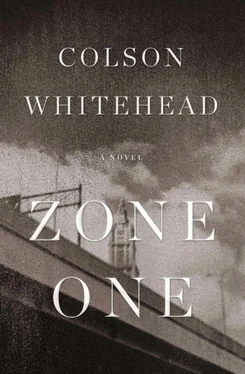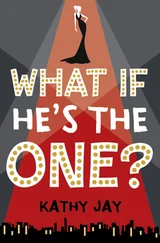Over time he learned how to isolate those last nights and say, That’s when they broke through the barrier. In the middle of the argument over the meaning of the foreign film they had been forced to see as members of an educated class: there. When they ran out of gas en route to the weekend at the friend’s cabin and sat in the car for half an hour under the bleak moon: right there. When the last nights became identifiable, the lag time between the incident and the leave-taking diminished. He suffered no appeal. There was no way they could convince him they were human. He was dragging a corpse out of a laundry joint on Chambers Street down in the Zone when he realized that the voice admonishing him to ditch the survivors he’d hooked up with, warning him away from others, was an echo of his relationship-snuffing voice. They are lost, they are the dead, it is time to leave.
Mim did not change. Horns didn’t pop out of her head or matted fur sprout on her hindquarters. Perhaps it would have happened to her in time. They were safe in the toy store. Granted asylum. To look at the lunar surface outside the shop, perhaps they were not on Earth at all, and subject to a different sort of gravity, new rules. No dead moved in the snow; Mim reckoned they were holed up in cellars, the abandoned gymnasiums of run-down high schools, caves and sewers and wherever else these monsters hibernated. No other survivors happened by; they were holed up, too, slowly rubbing their hands over the books they burned for heat, the novels devoted to the codes of the dead world, the histories, the poetry that went up so easily. Perhaps he and Mim were the last ones left. An entire society in a toy store on Main Street.
They furnished their pad in a series of forays, as if it were their first one, everything secondhand or at unbeatable prices—i.e., free. They hit all the local stores, affixing on objects in unison, disagreeing and deferring over placement with magnanimity: books; batteries; milk-crate accent tables; low-sodium ramen; lightweight portable stove; various buckets and plastic containers full of melted snow and purified water; the hyssop- and sandalwood-scented aromatherapy candles; lamps with adjustable arms capable of reducing their cones of illumination to the size of one six-point letter if needed; inflatable mattress with multiple comfort settings and heat massage; plastic boxes of antibacterial baby wipes that made them redolent of artificial lemons and lent their skin, when touched by the other’s lips or tongue, a metallic tang. They read and played games. The place was lousy with board games, of course, the childhood stalwarts and the modern abstrusities with mind-bending premises and loopy procedures. Every week or two they passed whipped-cream canisters back and forth and huffed until they felt their brain cells pop like soap bubbles.
They stashed emergency go-packs at either end of town, his and hers. They were not so deluded.
When the snows ebbed, it emerged that Main Street was a sort of dead highway for some reason. “How the roads are laid out around here, I guess,” Mim said, but it made for a lot of traffic. They nested in the reliquary on the second floor, where they could leave the shades open in daylight without fear. At the end of the spiral staircase the store’s owner, Manny (“Good Old” as they came to call him), displayed his prized commodities: the collectible defectives, limited editions, the whispered-about rarities. Anyone born after World War I could have found intersection with their secret or not-so-secret nostalgia in that trove of Depression-era rag dolls, atomic-age ray guns and scale-model fighter jets, intricate military play sets of quaint lethality, and action figures of cameo characters who had been inserted into the sequel for the express purpose of action-figure production. In the original packaging or an accomplished facsimile, and behind locked glass cabinets.
“This stuff is really valuable,” he said. His childish excitement flickering.
“Where? To whom? For what? That’s the old world.”
She was right, but he had hoped she’d play along, if only for a moment. The boy that wandered the cellar of his personality still nursed the naïve hunger for a life of adventure. As a kid he’d invented scenarios for adulthood: to outrun a fireball, swing across the air shaft on a wire, dismember the gargoyle army with the enchanted blade that only he could wield. Now he was grown up and the plague had granted him his wish and rendered it a silly grotesque. It was not so glamorous to spend two days doubled over, shitting your guts out because you’d gambled on the expired bottle of kiwi juice. All the other kids turned out to be postal workers, roofers, beloved teachers, and died. Mark Spitz was living the dream! Take a bow, Mark Spitz.
The key to the cabinet was downstairs, probably, but he let the treasures be. The generations had fixated on their lost toys, added to their already regrettable debt loads to obtain these tokens because the fantasies sustained them, the stories of the hand-shy orphans who discover their stolen birthright and rescue the kingdom or planetary system, the subgenre of misunderstood aliens and mechanical men who yearned to love. He’d always seen himself in them, the robots who roved the galaxy in search of the emotion chip, the tentacled things that were, beneath their mottled, puckered membranes, more human than the murderous villagers who hunted them for their difference.
The townspeople, of course, were the real monsters. It was the business of the plague to reveal our family members, friends, and neighbors as the creatures they had always been. And what had the plague exposed him to be? Mark Spitz endured as the race was killed off one by one. A part of him thrived on the end of the world. How else to explain it: He had a knack for apocalypse. The plague touched them all, blood contact or no. The secret murderers, dormant rapists, and latent fascists were now free to express their ruthless natures. The congenitally timid, those who had been stingy with their dreams for themselves, those who came out of the womb scared and remained so: These, too, found a final stage for their weakness and in their last breaths were fulfilled. I’ve always been like this. Now I’m more me.
They passed the time, made the nights as lovely as they could. When they discovered they were out of condoms, she told him to pull out and they came otherwise. “Enough babies,” she said. Before the plague, he’d always thought it weird when people said that, as they croaked about overpopulation, the millions of kids in want of a good home, ever-shrinking planetary resources of manifold aspect. Now Mark Spitz understood plainly what they had meant by “What kind of person would bring a child into this world” and then recited statistics about polluted water tables on the other side of the world, the asphyxiated ecosphere. The answer was, “Only a monster would bring a child into this world.”
The last snows were a month behind them. They were lying on the roof looking at the stars. He’d grown up after the time when they taught the constellations, but he knew a handful. Mim was acquainted with a few more. They kept their voices down. The reality: if it was warm enough for them to stargaze, it was warm enough to start moving.
“I’ll say one thing about the world today, it really keeps the pounds off,” she said.
“Starvation will do that.”
“I think it was all the running. I haven’t been in this kind of shape since college.” She brought up Buffalo. Mim still believed in Buffalo.
“By the time you hear about a place, it’s gone,” Mark Spitz said. “I think the very act of hearing about a place seems to will its disappearance.”
“This place is different. Someplace has to be.” His head was on her stomach. Her fingertips drew letters on his scalp. Words? A name? Her kids’ names? “Or else we should just end it now.”
Читать дальше












